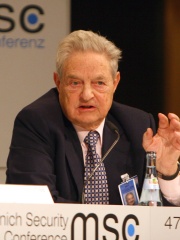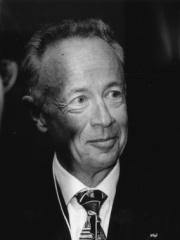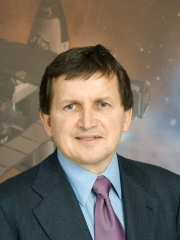


The Most Famous
BUSINESSPEOPLE from Hungary
This page contains a list of the greatest Hungarian Businesspeople. The pantheon dataset contains 847 Businesspeople, 3 of which were born in Hungary. This makes Hungary the birth place of the 37th most number of Businesspeople behind Saudi Arabia, and Australia.
Top 3
The following people are considered by Pantheon to be the most legendary Hungarian Businesspeople of all time. This list of famous Hungarian Businesspeople is sorted by HPI (Historical Popularity Index), a metric that aggregates information on a biography's online popularity.

1. George Soros (b. 1930)
With an HPI of 81.39, George Soros is the most famous Hungarian Businessperson. His biography has been translated into 81 different languages on wikipedia.
George Soros (born György Schwartz; August 12, 1930) is a Hungarian-American investor and philanthropist. As of May 2025, he has a net worth of US$7.2 billion, having donated more than $32 billion to the Open Society Foundations, of which $15 billion has already been distributed, representing 64% of his original fortune. In 2020, Forbes called Soros the "most generous giver" in terms of percentage of net worth. Born in Budapest to a non-observant Jewish family, Soros survived the Nazi occupation of Hungary and moved to the United Kingdom in 1947. He studied at the London School of Economics and was awarded a BSc in philosophy in 1951, and then a Master of Science degree, also in philosophy, in 1954. Soros started his career working in British and American merchant banks, before setting up his first hedge fund, Double Eagle, in 1969. Profits from this fund provided the seed money for Soros Fund Management, his second hedge fund, in 1970. Double Eagle was renamed Quantum Fund and was the principal firm Soros advised. At its founding, Quantum Fund had $12 million in assets under management, and as of 2011 it had $25 billion, the majority of Soros's overall net worth. Soros is known as "The Man Who Broke the Bank of England" as a result of his short sale of US$10 billion worth of pounds sterling, which made him a profit of $1 billion, during the 1992 Black Wednesday UK currency crisis. Based on his early studies of philosophy, Soros formulated the general theory of reflexivity for capital markets, to provide insights into asset bubbles and fundamental/market value of securities, as well as value discrepancies used for shorting and swapping stocks. Soros supports progressive and liberal political causes, to which he dispenses donations through the Open Society Foundations. Between 1979 and 2011, he donated more than $11 billion to various philanthropic causes; by 2017, his donations "on civil initiatives to reduce poverty and increase transparency, and on scholarships and universities around the world" totaled $12 billion. His influence and activities helped set off the fall of communism in Eastern Europe in the late 1980s and early 1990s, and provided one of Europe's largest higher education endowments to the Central European University in his Hungarian hometown. Soros's extensive funding of political causes has made him a "bugaboo of European nationalists". Numerous far-right theorists have promoted claims that characterize Soros as a dangerous "puppet master" behind alleged global plots. Criticisms of Soros, who is a Holocaust survivor, have often been called antisemitic conspiracy theories. In 2018, The New York Times reported that "conspiracy theories about him have gone mainstream, to nearly every corner of the Republican Party".

2. Andrew Grove (1936 - 2016)
With an HPI of 63.27, Andrew Grove is the 2nd most famous Hungarian Businessperson. His biography has been translated into 31 different languages.
Andrew "Andy" Stephen Grove (born Gróf András István; 2 September 1936 – 21 March 2016) was a Hungarian-American businessman and engineer who served as the third CEO of Intel Corporation. He escaped from the Hungarian People's Republic during the 1956 revolution at the age of 20 and moved to the United States, where he finished his education. He was the third employee and eventual third CEO of Intel, transforming the company into the world's largest semiconductor company. As a result of his work at Intel, along with his books and professional articles, Grove had a considerable influence on the electronics manufacturing industries worldwide. He has been called the "guy who drove the growth phase" of Silicon Valley. In 1997, Time magazine chose him as "Man of the Year", for being "the person most responsible for the amazing growth in the power and the innovative potential of microchips." One source notes that by his accomplishments at Intel alone, he "merits a place alongside the great business leaders of the 20th century."

3. Charles Simonyi (b. 1948)
With an HPI of 62.49, Charles Simonyi is the 3rd most famous Hungarian Businessperson. His biography has been translated into 38 different languages.
Charles Simonyi (; Hungarian: Simonyi Károly, pronounced [ˈʃimoɲi ˈkaːroj]; born September 10, 1948) is a Hungarian-American software architect, businessman, and space tourist. He led the development of Microsoft's first application software, including early versions of Microsoft Office, and later co-founded Intentional Software, a company focused on his concept of intentional programming. A former researcher at Xerox PARC, he helped pioneer graphical user interfaces and introduced object-oriented programming and Hungarian notation to Microsoft. Simonyi flew to space twice as a private citizen, becoming the fifth space tourist and the only one to pay for two separate trips to the International Space Station. As of January 2025, his net worth was estimated at US$7.5 billion.
People
Pantheon has 3 people classified as Hungarian businesspeople born between 1930 and 1948. Of these 3, 2 (66.67%) of them are still alive today. The most famous living Hungarian businesspeople include George Soros, and Charles Simonyi. The most famous deceased Hungarian businesspeople include Andrew Grove.

